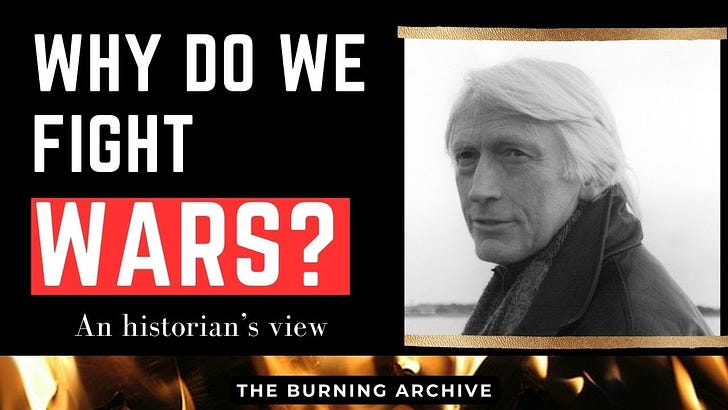Why do we go to war?
Is it our greed?
Is it their lust for power?
Do we defend our values? But then, why war? Why not live and let others live?
Do we fight because of something in our genes, or for our genes?
Or is war caused by some built-in feature of our minds? Does our psychology explain the human habit of war? Our culture? Our biology? Our society?
All these questions are explored in Richard Overy’s Why War?
He begins the book by contrasting the optimistic peace activists of the 1920s and 1930s, including Albert Einstein, to the fatalistic scholars of aggression, including Sigmund Freud. Indeed, Einstein wrote on behalf of the League of Nations to Freud to ask: can we humans use our modern science to prevent war? The gloomy psychoanalyst told the hopeful physicist he was dreaming. Of course not, Freud responded. We repress aggression and an ancient death drive. War is in our nature.
But what does history say?
Richard Overy’s Why War? is a brilliant account of eight causes of war, both nature and nurture. He reviews many debates, such as that between Freud and Einstein, on why war is so persistent a feature of human history.
Overy is one of the world’s leading military historians. His Blood and Ruins: the Last Imperial War, 1931-1945 (2022) is a brilliant reinterpretation of World War Two. It takes a global perspective, reframes the narrative of the war, and explores themes including the emotional experience of war among both the military and civilians. He specialises in World War Two. His histories of that most deadly of human conflicts look at air power, Russia’s experience, an illustrated history, Blood and Ruins and many more. He has written a history of battle that examines one hundred battles from across the world to examine the experience of war at its most intense. He has even prepared a list of the fifty top events in world history. There are few scholars better placed to ask the question, ‘Why war?’ What prevents us from realising the wish, so often expressed since 1945, of “Never again.”
Oswald Spengler once wrote that:
“Peace is a desire. War is fact.”
— Oswald Spengler
More mundanely, the international relations scholar, Kenneth Waltz, founder of the Neorealist school of international relations, which John Mearsheimer succeeded to, said:
“War is normal.”
— Kenneth Waltz
If we are to prevent war, or at least to mitigate the suffering during the next war, we must face the reality of war. We must also explore millennia of scholarship and human reflection on the causes of war.
Overy notes that:
“Lethal, intergroup violence is evident even before the first large-scale sedentary communities or the first states.”
— Richard Overy, Why War?
This sad truth forces us to ask why, not to dream why not. Overy reviews the contributions of many disciplines to diagnosing eight main explanations for why war persists. He examines scientific disciplines (such as evolutionary biology and psychology) and humanistic disciplines (such as anthropology, international relations, and history).
He divides his book into two parts, each examining debates on four causes.
Part One examines the causes that lie external to us or in our nature: biology, psychology, anthropology, and ecology.
Part Two examines four motives or choices that drive us to unleash the dogs of war: resources, belief, power, and security.
I provide an overview of this quality world history book in this YouTube video
Why War? distils a lifetime of scholarship into eight lessons from which we can all learn. You can buy Overy’s book at the affiliate link in the button here 👇.
In the bonus post for paid subscribers below I dive more deeply into Overy’s chapter on the psychology of conflict.
Why do we ride to war shouting “Them vs Us”?
We see it in the wars of today and the past. We see it in political polarisation, in culture wars, in information wars, in propaganda, in cancel culture, in communal violence in Britain and Bangladesh, and, at its worst, in genocides and dehumanisation.
We see how all kinds of media can bring out the worst of our ordinary selves when we succumb to headlines that demonise, scapegoat and screech: “They are the enemy.”
Coincidentally, in my Saturday post on the 120 Nobel Literature Prize Challenge this week I quoted the comment of Elias Canetti (1981 Nobel Prize for Literature).
It is always the enemy who started it, even if he was not the first to speak out, he was certainly planning it; and if he was not actually planning it, he was thinking of it; and, if he was not thinking of it, he would have thought of it.
― Elias Canetti, Crowds and Power
What is the psychology that defines enemy and friend in war? The post below distils the lessons of Overy’s book.
By subscribing you will be able to read below how Canetti might have had more insight into the psychology of war than his fellow refugee of the Austro-Hungarian empire, Sigmund Freud. I share with you my reading notes on:
Insights and sources of the chapter on the psychology of conflict
Explanations from psychoanalysis and evolutionary psychology
Social psychological explanations of why war?
Takeaways on how to moderate “Them vs Us” thinking habits,
And paid subscribers get my bonus audio voiceover of this article!


